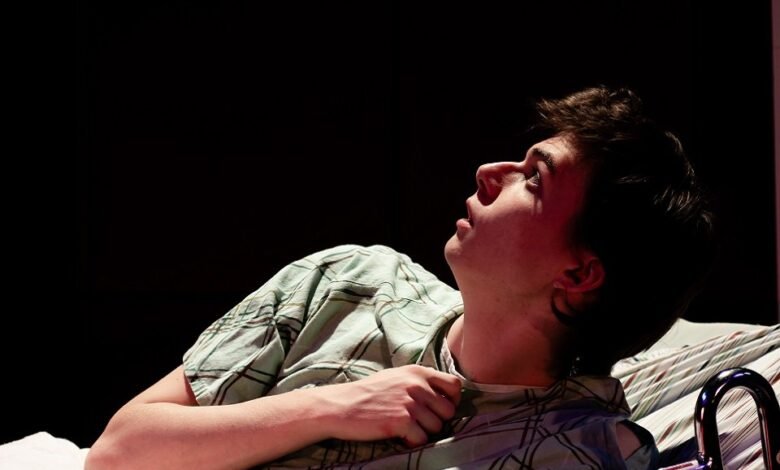University Theatre’s ambitious ‘Angels in America, Part One: Millennium Approaches’ transforms as it progresses – Isthmus


Let me start by saying I love this play. I first encountered Tony Kushner’s 1991 surrealist epic Angels in America, Part I: Millennium Approaches in a 1993 UW-Madison theater literature course. From that initial reading, I became obsessed. (I even have a CD signed by Kushner to prove it!)
From the start, Angels was almost universally acclaimed. It is the first play to receive back-to-back Tony Awards for Best Play for its two parts, as well as the Pulitzer Prize for Drama and several Drama Desk awards. The play has been adapted into multiple formats, including opera and an HBO miniseries. The HBO adaptation, featuring Al Pacino and Meryl Streep, also garnered Emmy, Golden Globe, and Screen Actors Guild awards.
These are big shoes to fill, and director Audrey Lauren Standish does well with Kushner’s masterwork in University Theatre’s current production, especially in highlighting the characters’ quests for personal identity. Standish excels in the intimate two-character scenes, bringing out the best in the show’s young actors. She does not capture the spectacle of the play — nor does she seem to try. Her strength lies in delving into the characters’ emotional cores. The production transforms as it progresses.
Angels in America, Part I weaves together the tumultuous lives of two couples in 1980s New York City. At the heart of the story are Louis Ironson (Aris Awes) and Prior Walter (Nicky Chier). Their relationship is tested when Prior is diagnosed with AIDS. As Prior’s health deteriorates, Louis, overwhelmed by fear and guilt, ultimately abandons him in his greatest time of need. Prior’s journey through illness is marked by haunting and surreal visions, including visitations from an angel, pushing him toward a deeper understanding of life and resilience.
Parallel to their story is that of Joe Pitt (Grant Borcherding) and his wife Harper (Maria Kolb). Joe, a closeted Mormon lawyer working under the notorious Roy Cohn (Malcolm McCanles), grapples with his repressed sexuality and conservative upbringing. Harper struggles with a Valium addiction and severe anxiety, escaping into vivid hallucinations that reflect her inner turmoil. As Joe confronts his true identity, he forms a complex relationship with Louis, further entangling the lives of all involved.
Act one often misses the mark, but once the actors stop playing stereotypes, the play starts to fall into place.
Chier’s Prior Walter is one such evolution. By acts two and three, he is powerful and vulnerable and becomes the emotional core of this production. His journey from despair to a tenuous hope is portrayed with raw authenticity.
As Louis, Awes delivers a compelling performance marked by moral ambiguity and internal conflict. Borcherding and Kolb, as the Mormon couple, create a poignant narrative of repression and longing. Kolb’s hallucinatory Antarctic wanderings are especially strong.
As their stories intersect with Cohn, the ruthless, closeted lawyer’s manipulative and toxic presence is a dark reminder of the era’s hypocrisy and corruption. McCanles’ performance as Cohn is a bit over the top. At first it felt like he was trying to be Pacino as Roy Cohn, but he eventually found the right balance later in the play.
All of the actors play multiple roles, but it is Ava Childs who does so most successfully. Her delivery of Hannah Pitt, Joe’s mother, during his coming-out scene felt authentic to the time period.
Overall, the production lacks the magnificent spectacle that the script calls for, save for the final Biblical cameo. Jim Greco’s costume design effectively evokes the feel of the 1980s, and his set design of gray, Tetris-inspired geometric blocks meets the play’s needs. While Zak Stowe’s robust lighting design contributes significantly, the play requires more from the overall production design to fully realize its more fantastic elements.
Despite these flaws, this rendition of Angels in America, Part I: Millennium Approaches is a powerful and moving experience, an ambitious attempt at an important play. The actors’ performances, especially in the later acts, bring depth and authenticity to Kushner’s complex characters.
Angels in America Part 1: Millennium Approaches is playing at the Hemsley Theatre at UW-Madison through Aug. 4 and then is remounted from Sept. 12-22. For Kushner and Angels fans, there will be a staged reading of Part 2: Perestroika showing in the Mitchell Theatre Sept. 18-22.


